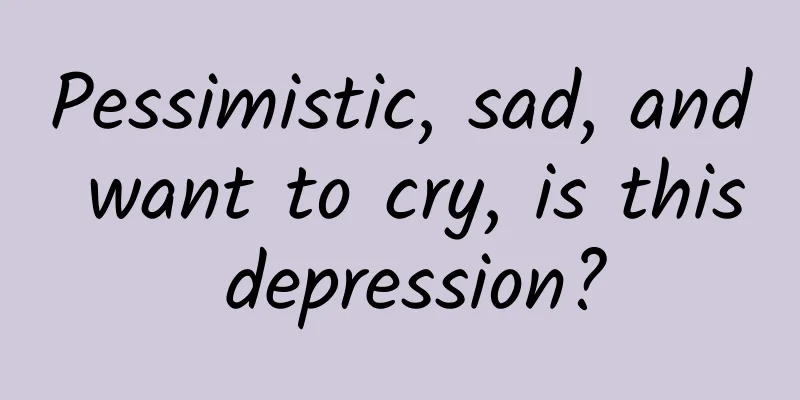Pessimistic, sad, and want to cry, is this depression?

|
Author: Wang Xiaomin, Sichuan Province Zigong Mental Health Center Reviewer: Zhang Guangyi, deputy chief physician, First People's Hospital of Zigong City, Sichuan Province In daily life, most people experience negative emotions such as sadness, grief, and depression. When we are in this negative mood, we may wonder, "Am I suffering from depression?" Usually, these negative emotional experiences are triggered by external environmental events and may gradually ease as the events are resolved. They may last for more than 2 weeks, but in most cases they can be self-controlled and regulated. We call the negative manifestations at this stage depressive tendencies. However, if this low mood, pessimism and negativity persist, and there is a loss of interest in things, and if self-regulation is not possible for a long time, it may develop into depression in severe cases. 1. What is the difference between depressive tendencies and depression? [1-3] Depressive tendency is a transitional stage between clinically diagnosed depression and no depressive symptoms, and is a psychological sub-health state. Depression, as a mental disorder, has low mood, lack of interest, and slow thinking as core symptoms, accompanied by self-blame, memory loss, suicidal tendencies and other symptoms. Individuals with depressive tendencies may show multiple depressive symptoms such as pessimism, inferiority, loneliness and worthlessness, and 2 to 4 of these symptoms will last for more than 2 weeks. However, the severity of their symptoms is lower than that of patients with depression, and they do not meet other diagnostic criteria for clinical depressive disorders, but they are very likely to develop depression. 2. How to prevent depressive tendencies from developing into depression? Let’s take a look at Xiaohong’s example! Xiaohong is a senior high school student and will take the college entrance examination in two months. In the recent mock exam, her results were not ideal. Xiaohong looked at her report card and was sad for a long time. Xiaohong: "I did so badly on the mock test this time. I'm unhappy. Am I going to be depressed? What should I do?" Figure 1 Copyright image, no permission to reprint Emotion dysregulation is a warning sign that a person may become depressed when they are unable to adequately regulate their emotions after experiencing a negative event. Emotion regulation plays a key role in improving depressive symptoms. In short, Xiaohong's mental condition is alarming and she needs to adjust her emotions as soon as possible. Emotion regulation refers to the processes by which we influence our emotions, including when we feel them and how we experience and express them. Gross (an important figure in the field of emotion research) believes that understanding how emotions are generated is crucial for emotion regulation. The emotion regulation process model he proposed divides emotion regulation into five stages: situation selection, situation modification, attention allocation, cognitive change, and response adjustment [1, 4]. 1. Situation selection and situation modification is to change emotions by changing the situation, that is, to stay away from or change the environment that will cause us to have negative emotions, and choose a situation that can bring positive emotions. Figure 2 Copyright image, no permission to reprint 2. In attention allocation, attention distraction strategy is often automatically selected. When we are in a negative mood, we tend to focus more on the local information that makes us have negative emotions. At this time, distracting our attention and doing other things may make us feel better. Figure 3 Copyright image, no permission to reprint 3. The commonly used strategy in the cognitive change stage is cognitive reappraisal, which is to reinterpret the events that trigger emotions, or think about how I will view this incident ten years later? Figure 4 Copyright image, no permission to reprint 4. A commonly used strategy in response adjustment is expression suppression, which is to suppress the behavioral expression of emotions, such as changing facial expressions and keeping a smile even when feeling uncomfortable. Figure 5 Copyright image, no permission to reprint 3. Which of the five stages of emotion regulation is better? Please allow the “five contestants” to speak! Situation Selection and Situation Modification: “We choose to leave or change our environment, but sometimes it’s not easy.” Attention Divided: “As we age, people use divided attention less and less!” Response Adjustment: "Expression suppression simply hides your true emotions and is a non-adaptive strategy!" Cognitive change: “I can effectively reduce negative emotional experiences and be adaptive!” Xiaohong asks for help Xiaohong: "I'm very unhappy recently, can you help me?" Cognitive change: "Of course, how do you think this unhappy feeling comes about?" Xiao Hong: "Is it a direct result of my poor performance on the mock exam?" Cognitive change: "No, how we view and interpret events is the key to the generation of emotions, that is, events → cognition → emotions. Doing poorly on a mock exam will not directly cause you to be unhappy, but how you view the poor performance on the mock exam is what affects your emotions." Cognitive change: “Cognitive reappraisal includes reinterpretation and separation strategies, both of which can help you regulate your emotions.” Xiao Hong: "Can you explain it in more detail?" Cognitive reappraisal: "What do you think about when you do poorly on a mock test?" Xiao Hong: "I'm such a loser. I can't get into the university of my choice. My life is over!" Re-explain strategy: "Maybe the test was too difficult, or maybe you were not in good condition during the test. This doesn't mean you are bad." Separation strategy: "From a long-term perspective, failing to get into the university of your choice does not mean your life is over, and a mock exam score cannot represent the college entrance examination score." Xiaohong: "I understand. Can you introduce some more tips on adjusting cognition?" Cognitive change: "Of course." When we have negative emotions, we can think about: 1. What evidence is there to prove that my idea is correct? What is the evidence against it? 2. Are there any other explanations or opinions? 3. What would be the worst outcome? If it does happen, how should I cope? What is the best outcome? What is the most likely outcome for this situation? 4. If my friend or family member were in the same situation, what would I say to him? 5. What should I do? Please let Xiaohong make a summary speech: Xiaohong: "The result of one test cannot represent the final college entrance examination score, let alone the whole life. I did well in other tests. I also worked hard. I still have time. I will analyze the wrong questions and see which knowledge points I didn't master. Don't feel bad!" Figure 6 Copyrighted images are not authorized for reproduction Depression ≠ depression. When depressive tendencies appear, please regulate your emotions in a timely manner, among which cognitive changes are the key. References [1] Du Xue, Yao Li, Chen Xiaoyi, et al. Emotion regulation strategies and neural mechanisms of individuals with subthreshold depression[J]. Psychological Bulletin, 2023, 6(4): 233-239. [2]LV Q, Li X, Zhang Y, et al. Sex differences in subjective cognitive impairment and clinical correlates in Chinese patients with subthreshold depression[J]. Biol Sex Differ, 2023, 14(1):6. [3]VOLZ HP, STIRNWEIß J, KASPER S, et al. Subthreshold depression – concept, operationalisation and epidemiological data. A scoping review[J]. Int J Psychiatry Clin Pract, 2023, 27(1):92-106. [4] Zhang Dandan, Li Sijin. Neural circuits of emotion regulation and their manifestations in people with emotional disorders[J]. Journal of Sichuan Normal University, 2024, 47(3): 285-293. |
<<: Intracranial arachnoid cyst: Everything you should know before surgery
>>: Pay attention to Group B Streptococcus and help your baby grow healthily
Recommend
Does eating coriander increase milk production or stop milk production?
What breastfeeding mothers worry about most is th...
Should we eat glutinous rice balls or Yuanxiao during the Lantern Festival? Today we won’t talk about “salty and sweet”, eating it this way is more “elegant”
During the Lantern Festival, eating a bowl of sof...
Treating menstrual syndrome, eating these foods can effectively improve
Menstruation is something that women experience e...
Can I still get pregnant if my ovarian follicle ruptures?
In fact, you don’t need to worry about follicle r...
What are the symptoms of a pregnant woman giving birth to a girl?
During pregnancy, many changes occur in the body ...
Can I eat barley porridge during breastfeeding?
In order to take care of the baby in her body, br...
Women will age quickly after having a second child
The issue of pregnancy puts too much pressure on ...
Polycystic ovary syndrome recovered after running exercise
Polycystic ovary syndrome is also called polycyst...
How many days can you detect pregnancy?
Modern women basically use pregnancy test strips....
How to make breasts grow better?
The chest is the most important part of a woman&#...
How to restore the pelvis after childbirth, do you do this?
The pelvis of women will be affected to a certain...
What is the routine procedure for leucorrhea examination?
The so-called leucorrhea is a white liquid that f...
How to ferment bean cake fertilizer quickly? How long does it take for the bean cake to be used?
Bean cake fertilizer is a very common organic fer...
What should I do if I have dysmenorrhea or scanty menstruation?
Many female friends will feel dysmenorrhea during...
"Super sweet potato" in the sand: although it is very earthy, it is a "smooth artifact"!
Want to find a cheap and easy-to-use "smooth...









